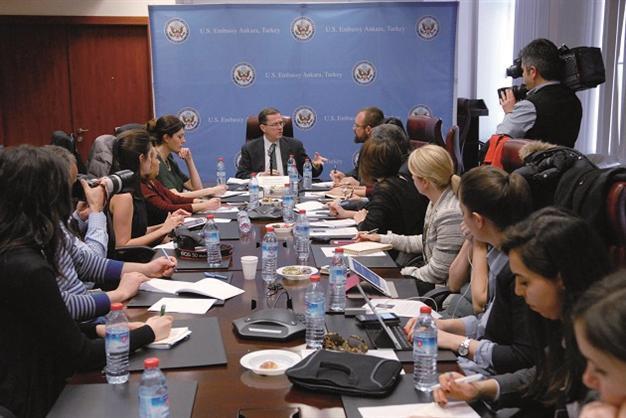US concerned over ‘deteriorating rights’ in Turkey
Sevil Erkuş - ANKARA

Thomas O. Melia, the deputy assistant secretary of the U.S. State Department’s Bureau of Democracy, Human Rights and Labor (DRL), voices concerns.
People in a democratic country should be able to express criticism of their leaders, a senior U.S. official has said, voicing Washington’s concern over Turkey’s human rights situation, amid a series of recent cases in which senior elected officials have opened cases against citizens upon alleged “insults.”“We are very concerned about this. People have been prosecuted for speaking their mind. In a democratic country that respects freedom of expression, people should not be prosecuted for expressing their views on the government of the day or public officials,” said Thomas O. Melia, the deputy assistant secretary of the U.S. State Department’s Bureau of Democracy, Human Rights and Labor (DRL).
Melia’s comments came upon a question about people facing criminal charges due to their criticism against Turkish leaders posted on social media.
“People in a free society are allowed to complain about their leaders and their performance,” he told reporters on Feb. 27 after holding meeting with ruling Justice and Development Party (AKP) officials and local civil society representatives, ahead of the release of the State Department’s annual report on human rights around the world.
It is problematic if anyone - whether they are an editor-of-chief a newspaper, a 16-year-old student, or a taxi driver - fears prosecution or imprisonment for expressing criticism in a public meeting or on social media, Melia added. “That’s one of the things that we are concerned in Turkey’s human rights environment today,” he said.
Melia said he discussed the rights of women and the question of domestic violence against women with government officials, who acknowledged the problem and asked if Washington could share its experience in tackling the issue in the U.S.
He added that the U.S. is “uneasy” about a number of measures included in the controversial AKP-led national security package, which is currently being debated at parliament.
“We share the concern with many others that this may lead to some overzealous prosecution of things that might otherwise not be prosecuted. It will give the police additional authorities that may involve strong police measures against peaceful protestors, as well as additional or unlimited detention for peaceful protestors in some circumstances,” Melia said.
Comparing Turkey’s human rights performance in 2014 to previous years, Melia said there had been a deterioration.
“There have been new pressures on the media, prosecutions of people for speaking their mind, and proposals that have been put forward in parliament that make it easier to prosecute people and make it more difficult to express their rights,” he said.
Touching on the ongoing presidential system debate in Turkey, in which the U.S. system is often referred to, Melia said powers are not concentrated into a few hands in the American system. He stressed that the president’s powers are bounded by a system of check of balances and by the judiciary, also citing the federal system, in which many powers are devolved to the states.
Melia also said the media has a crucial role to play, adding that the U.S. president is scrutinized by a varied and independent press.
















